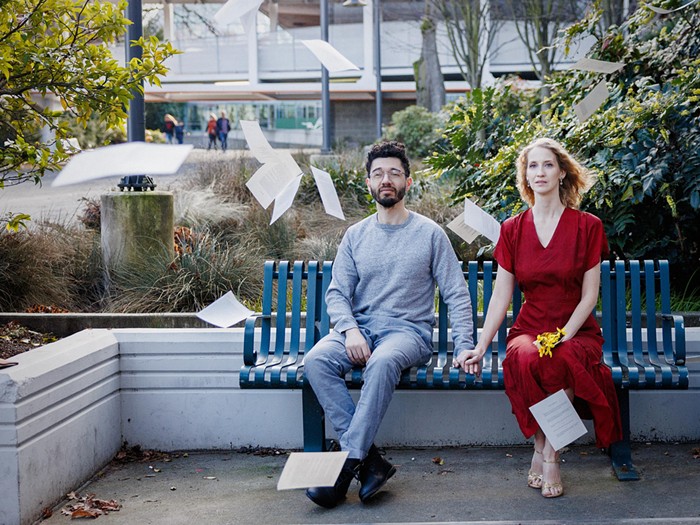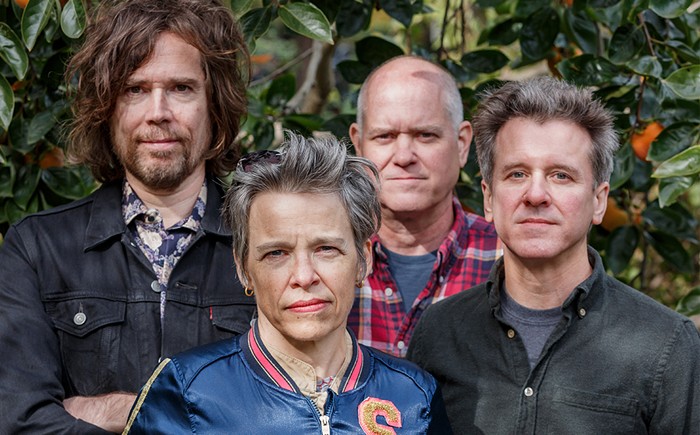
These next few days are your absolute last chance to see the Kusama exhibit at SAM: Because the world-famous exhibit ends September 10. Take a selfie, don’t take a selfie, ponder which Infinity Room would be best to masturbate in, who cares—just try to see it, because it’s worth it. Timed tickets for same-day entry are available on site at the museum—and lines have been known to wrap around the block.
Our Art and Performance guide is out: Once the ash clears and the temperature drops, you can start getting ready for fall with our information-soaked guide to the fall arts season. We’ve got the best of what readings and talks, films, and performances you’ll want to add to your calendar this fall. Plus, Sean Nelson gets emotional at MoPop’s Jim Henson exhibit, and I guide you through the finer points of a beautiful and haunting wood-carved sculpture by artist Humaira Abid, whose first solo show debuts at the Bellevue Arts Museum on September 22.
Seattle Rep’s inaugural Public Works Seattle performance sounds enchanting and fun: It’s their new attempt at “theatre of, by, and for the people," it’s based on Todd Almond's musical adaptation of The Odyssey, and best yet—it will involve 160 Seattle-area residents, including an 80-person community ensemble with people aged 2-78.
Music and culture critic Ann Powers will be interviewed by KEXP DJ Riz Rollins tomorrow night: Her new book, Good Booty, examines the role that sex and race play in the history of American music, told partially through Powers’s own story of her early musical influences. In an interview with Andrew Hamlin this week, Powers goes into depth about these early influences (like Paul McCartney and Jackson 5), and "the African and Creole women and men whose names we don't know, whose music and dance legacies still undergird so much American music.” Speaking of new books coming out, Sean Nelson is intrigued by Hil’s new book cover.
Upstream dates announced: The Upstream Music Fest + Summit, Paul Allen’s PNW-focused festival, which debuted last May, has announced the dates for their second festival: June 1-3, 2018. Based on last year’s assessments, you can expect a TON of local bands (last year there were more than 300), a two-day summit focused on the business of music, and possibly an annoying bracelet and bag policy (unless they can figure out a way around it). Artist submissions will open in November.
Speaking of festivals, Earshot Jazz starts October 8: The expansive festival spans five weeks and multiple genres (not just jazz), including avantgrade, hiphop, and fusion. But if you're a jazz purist, there's also contemporary headliners like Wycliffe Gordon and Brad Mehldau.
Creatives: Seattle’s Office of Film and Music and the Seattle Music Commission want to hear from you: In the coming months, they’ll be studying Seattle’s "creative economy" (defined loosely as people who work with products or services are inherently creative or artistic). Artists, musicians, filmmakers—this isn’t just dry data that’s going to be plugged into a spreadsheet, never to be seen again. Your input helps inform decisions that impact space accessibility, racial and gender equity, and employment opportunities. The survey is here.
Bellingham director’s Slits documentary hits the festival circuit: Bellingham filmmaker William E. Badgley has finished his long-awaited documentary about English post-punk greats the Slits. Here to Be Heard: The Story of the Slits will debut at the BFI London Film Festival on October 14.
The movie was made in conjunction with producer Jennifer Shagawat of Starcleaner Records. It traces the triumphs and struggles of the first all-female punk group—who incorporated elements of dub into their radically unconventional sound—from 1976 to 2010, the year in which charismatic lead vocalist Ari Up died. In a 2015 interview with The Stranger, Badgley—who also directed Kill All Redneck Pricks: A Documentary Film About a Band Called KARP—said that the film’s most unifying theme “is the unwillingness to be contained… inside of a gender.” Let’s hope a Seattle theater books Here to Be Heard soon.


















